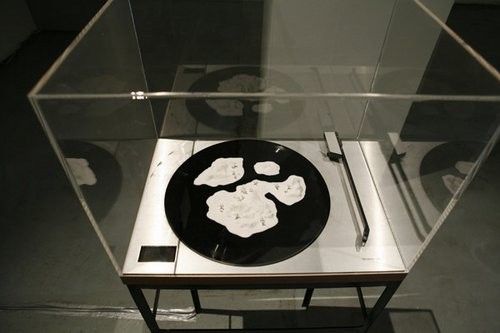Julien Grossmann
03 Jul - 01 Aug 2010
JULIEN GROSSMANN
Kokin (...) Slendro
Stella Art Foundation on Mytnaya Street
July 3 – August 1, 2010
Kokin (...) Slendro is a mixed media installation that deals with the spatial aspect of sound, both at the level of the physical objects that embody it and at the level of cultural or geographic spaces and identities that music can generate. As a whole, it triggers our representation of remote or “exotic” places and the complexity of trans-cultural relationships. The installation consists in a series of six islands, little models realized in rapid prototyping, which are placed at the centre of vinyl records. Theses landscapes, situated on minimalist turntables, slowly revolve whilst corresponding tracks are being played. Each ensemble is positioned a few meters away from the others in the exhibition space, letting the visitors freely move from one to another in order to listen to the music each diffuses alternatively. The six instrumental songs that accompany the diorama are each interpreted with a modified synthesizer mimicking certain acoustic principles. Each track uses only two sounds, and finally resembles simple acoustic duets.
The six pieces are also each based on a different scale and tuning systems, borrowed from diverse areas of the world. These systems generally translate, through a specific tone ordering that is shaped both by acoustic principles and cultural developments, a musical identity belonging to a recognizable tradition. Here is the origin, largely summarized, of the scales that are used in the installation: - Kokin is a traditional Japanese scale - Myxolidian is an ancient Greek scale, at the origin of certain western tonal systems - Kourd Atar Todi is originally an Arabic scale, that was slightly transformed after its emigration to India - Pigmy is a traditional scale from Rwanda, also used in other countries of central Africa - Rumanikos is an old Greek scale, nowadays popular thanks to Gypsy music - Slendro is an Indonesian tuning system, principally used by Gamelan orchestras Each of the six entities that are presented within the installation – Kokin, Myxolydian, Kourd Atar Todi, Pigmy, Rumanikos and Slendro – is thus formed by the association of a territory, with its own relief and vegetation, and of a music piece that has both a specific scale and a particular instrumentation.
Automated and synchronized, the six record players function in a particular ordering, creating a dialog between the different entities.
Julien Grossmann was born in 1983 in Metz, France. He studied at the Conservatory for nine years, and graduated from the Dutch Art Institute (the Netherlands) in 2008.
Kokin (...) Slendro
Stella Art Foundation on Mytnaya Street
July 3 – August 1, 2010
Kokin (...) Slendro is a mixed media installation that deals with the spatial aspect of sound, both at the level of the physical objects that embody it and at the level of cultural or geographic spaces and identities that music can generate. As a whole, it triggers our representation of remote or “exotic” places and the complexity of trans-cultural relationships. The installation consists in a series of six islands, little models realized in rapid prototyping, which are placed at the centre of vinyl records. Theses landscapes, situated on minimalist turntables, slowly revolve whilst corresponding tracks are being played. Each ensemble is positioned a few meters away from the others in the exhibition space, letting the visitors freely move from one to another in order to listen to the music each diffuses alternatively. The six instrumental songs that accompany the diorama are each interpreted with a modified synthesizer mimicking certain acoustic principles. Each track uses only two sounds, and finally resembles simple acoustic duets.
The six pieces are also each based on a different scale and tuning systems, borrowed from diverse areas of the world. These systems generally translate, through a specific tone ordering that is shaped both by acoustic principles and cultural developments, a musical identity belonging to a recognizable tradition. Here is the origin, largely summarized, of the scales that are used in the installation: - Kokin is a traditional Japanese scale - Myxolidian is an ancient Greek scale, at the origin of certain western tonal systems - Kourd Atar Todi is originally an Arabic scale, that was slightly transformed after its emigration to India - Pigmy is a traditional scale from Rwanda, also used in other countries of central Africa - Rumanikos is an old Greek scale, nowadays popular thanks to Gypsy music - Slendro is an Indonesian tuning system, principally used by Gamelan orchestras Each of the six entities that are presented within the installation – Kokin, Myxolydian, Kourd Atar Todi, Pigmy, Rumanikos and Slendro – is thus formed by the association of a territory, with its own relief and vegetation, and of a music piece that has both a specific scale and a particular instrumentation.
Automated and synchronized, the six record players function in a particular ordering, creating a dialog between the different entities.
Julien Grossmann was born in 1983 in Metz, France. He studied at the Conservatory for nine years, and graduated from the Dutch Art Institute (the Netherlands) in 2008.

